Harriet Jacobs and the American Civil War
week 12 post_civil_war

Little Women
• Little Women is still an incredibly popular book. It explores the private lives of young women in the mid-19th century. • Even though it is set during the civil war, it doesn’t mention the war, or slavery, very much!! • This reflects the relatively mild effects of the war in the North.
In the hospitals
• We have a clear idea of what life was like in the civil war hospitals because of accounts written by those who visited them. • Louisa May Alcott and Walt Whitman both worked in war hospitals.
Abraham Lincoln
• Lincoln delivered the Emancipation Proclamation in 1863. • This was the proclamation that emancipated (freed) the slaves.
The End of Slavery
Frederick Douglas
• Frederick Douglas was appointed to several important political positions. • He continued to lecture and give speeches throughout his life. • After Lincoln died Frederick Douglas gave a speech at the unveiling of his memorial
《诺顿文学选读》目录
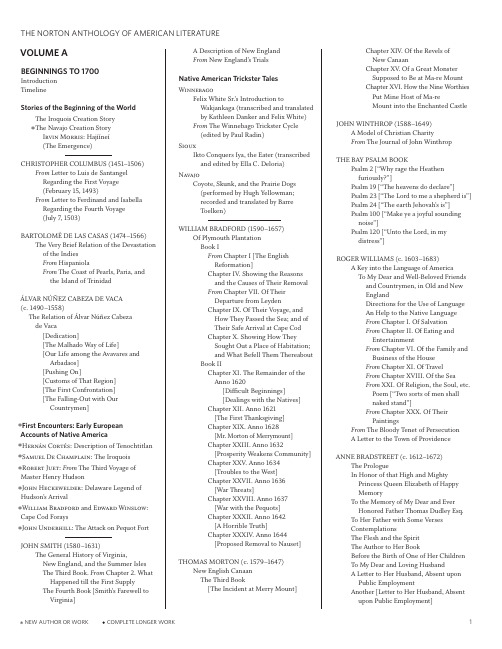
VOLUME ABEGINNINGS TO 1700IntroductionTimelineStories of the Beginning of the WorldThe Iroquois Creation Story*T he Navajo Creation StoryIrvin Morris: Hajííneí(The Emergence) CHRISTOPHER COLUMBUS (1451–1506) From Letter to Luis de SantangelRegarding the First Voyage(February 15, 1493)From Letter to Ferdinand and IsabellaRegarding the Fourth Voyage(July 7, 1503)BARTOLOMÉ DE LAS CASAS (1474–1566) The Very Brief Relation of the Devastationof the IndiesFrom HispaniolaFrom The Coast of Pearls, Paria, andthe Island of TrinidadÁLVAR NÚÑEZ CABEZA DE VACA(c. 1490–1558)The Relation of Álvar Núñez Cabezade Vaca[Dedication][The Malhado Way of Life][Our Life among the Avavares andArbadaos][Pushing On][Customs of That Region][The First Confrontation][The Falling-Out with OurCountrymen]*First Encounters: Early European Accounts of Native America*Hernán Cortés: Description of Tenochtitlan *Samuel De Champlain: The Iroquois*Robert Juet:From The Third Voyage of Master Henry Hudson*John Heckewelder: Delaware Legend of Hudson’s Arrival*William Bradford and Edward Winslow: Cape Cod Forays*John Underhill: The Attack on Pequot Fort JOHN SMITH (1580–1631)The General History of Virginia,New England, and the Summer IslesThe Third Book. From Chapter 2. WhatHappened till the First SupplyThe Fourth Book [Smith’s Farewell toVirginia]A Description of New EnglandFrom New England’s TrialsNative American Trickster TalesWinnebagoFelix White Sr.’s Introduction toWakjankaga (transcribed and translatedby Kathleen Danker and Felix White)From The Winnebago Trickster Cycle(edited by Paul Radin)SiouxIkto Conquers Iya, the Eater (transcribedand edited by Ella C. Deloria)NavajoCoyote, Skunk, and the Prairie Dogs(performed by Hugh Yellowman;recorded and translated by BarreToelken)WILLIAM BRADFORD (1590–1657)Of Plymouth PlantationBook IFrom Chapter I [The EnglishReformation]Chapter IV. Showing the Reasonsand the Causes of Their RemovalFrom Chapter VII. Of TheirDeparture from LeydenChapter IX. Of Their Voyage, andHow They Passed the Sea; and ofTheir Safe Arrival at Cape CodChapter X. Showing How TheySought Out a Place of Habitation;and What Befell Them ThereaboutBook IIChapter XI. The Remainder of theAnno 1620[Difficult Beginnings][Dealings with the Natives]Chapter XII. Anno 1621[The First Thanksgiving]Chapter XIX. Anno 1628[Mr. Morton of Merrymount]Chapter XXIII. Anno 1632[Prosperity Weakens Community]Chapter XXV. Anno 1634[Troubles to the West]Chapter XXVII. Anno 1636[War Threats]Chapter XXVIII. Anno 1637[War with the Pequots]Chapter XXXII. Anno 1642[A Horrible Truth]Chapter XXXIV. Anno 1644[Proposed Removal to Nauset]THOMAS MORTON (c. 1579–1647)New English CanaanThe Third Book[The Incident at Merry Mount]Chapter XIV. Of the Revels ofNew CanaanChapter XV. Of a Great MonsterSupposed to Be at Ma-re MountChapter XVI. How the Nine WorthiesPut Mine Host of Ma-reMount into the Enchanted CastleJOHN WINTHROP (1588–1649)A Model of Christian CharityFrom The Journal of John WinthropTHE BAY PSALM BOOKPsalm 2 [“Why rage the Heathenfuriously?”]Psalm 19 [“The heavens do declare”]Psalm 23 [“The Lord to me a shepherd is”]Psalm 24 [“The earth Jehovah’s is”]Psalm 100 [“Make ye a joyful soundingnoise”]Psalm 120 [“Unto the Lord, in mydistress”]ROGER WILLIAMS (c. 1603–1683)A Key into the Language of AmericaTo My Dear and Well-Beloved Friendsand Countrymen, in Old and NewEnglandDirections for the Use of LanguageAn Help to the Native LanguageFrom Chapter I. Of SalvationFrom Chapter II. Of Eating andEntertainmentFrom Chapter VI. Of the Family andBusiness of the HouseFrom Chapter XI. Of TravelFrom Chapter XVIII. Of the SeaFrom XXI. Of Religion, the Soul, etc.Poem [“Two sorts of men shallnaked stand”]From Chapter XXX. Of TheirPaintingsFrom The Bloody Tenet of PersecutionA Letter to the Town of ProvidenceANNE BRADSTREET (c. 1612–1672)The PrologueIn Honor of that High and MightyPrincess Queen Elizabeth of HappyMemoryTo the Memory of My Dear and EverHonored Father Thomas Dudley Esq.To Her Father with Some VersesContemplationsThe Flesh and the SpiritThe Author to Her BookBefore the Birth of One of Her ChildrenTo My Dear and Loving HusbandA Letter to Her Husband, Absent uponPublic EmploymentAnother [Letter to Her Husband, Absentupon Public Employment]In Reference to Her Children,23 June 1659In Memory of My Dear GrandchildElizabeth BradstreetIn Memory of My Dear GrandchildAnne BradstreetOn My Dear Grandchild Simon BradstreetFor Deliverance from a FeverHere Follows Some Verses upon theBurning of Our HouseAs Weary PilgrimTo My Dear ChildrenMICHAEL WIGGLESWORTH (1636–1711) From The Day of DoomMARY ROWLANDSON (c. 1636–1711)♦ A Narrative of the Captivity andRestoration of Mrs. Mary Rowlandson EDWARD TAYLOR (c. 1642–1729)Psalm Two (First Version)Preparatory MeditationsPrologueMeditation 8 (First Series)Meditation 16 (First Series)Meditation 22 (First Series)Meditation 38 (First Series)Meditation 26 (Second Series)God’s DeterminationsThe PrefaceThe Soul’s Groan to Christ for SuccorChrist’s ReplyUpon Wedlock, and Death of ChildrenUpon a Wasp Chilled with ColdHuswiferyA Fig for Thee, Oh! DeathSAMUEL SEWALL (1652–1730)From The Diary of Samuel SewallThe Selling of Joseph: A Memorial COTTON MATHER (1663–1728)The Wonders of the Invisible World[A People of God in the Devil’sTerritories][The Trial of Martha Carrier]Magnalia Christi AmericanaGaleacius Secundus: The Life ofWilliam Bradford Esq., Governor ofPlymouth ColonyNehemias Americanus: The Life of JohnWinthrop, Esq., Governor ofthe Massachusetts Colony* A Notable Exploit: Dux Faemina FactiBonifaciusFrom Essays to Do GoodTHE NEW-ENGLAND PRIMER (1690) Alphabet AMERICAN LITERATURE 1700–1820IntroductionTimelineSARAH KEMBLE KNIGHT (1666–1727)The Private Journal of a Journey fromBoston to New YorkTuesday, October the ThirdFriday, October the SixthSaturday, October the SeventhDecember the SixthJanuary the SixthWILLIAM BYRD (1674–1744)From The Secret Diary of William Byrdof Westover, 1710-1712JONATHAN EDWARDS (1703–1758)Personal NarrativeOn Sarah PierpontSarah Edwards’s NarrativeA Divine and Supernatural LightSinners in the Hands of an Angry GodNative Americans: Contact and ConflictPontiac: Speech at DetroitSamson Occom:From A Short Narrativeof My LifeThomas Jefferson: Chief Logan’s Speech,From Notes on the State of VirginiaRed Jacket: Reply to the MissionaryJoseph CramTecumseh: Speech to the OsagesBENJAMIN FRANKLIN (1706–1790)The Way to Wealth*Polly BakerRules by Which a Great Empire May BeReduced to a Small OneInformation to Those Who WouldRemove to AmericaRemarks Concerning the Savages ofNorth America♦ The AutobiographyJOHN WOOLMAN (1720–1772)The Journal of John Woolman[Early Life and Vocation]J. HECTOR ST. JOHN DE CREVECOEUR(1735–1813)Letters from an American FarmerFrom Letter III. What Is an AmericanFrom Letter IX. Description ofCharles-TownFrom Letter X. On Snakes; and on theHumming BirdFrom Letter XII. Distresses of aFrontier ManJOHN ADAMS (1735–1826) and ABIGAILADAMS (1744–1818)LettersAbigail Adams to John Adams (August 19,1774) [Classical Parallels]John Adams to Abigail Adams (September16, 1774) [Prayers at the Congress]John Adams to Abigail Adams (July 23,1775) [Dr. Franklin]John Adams to Abigail Adams (October29, 1775) [Prejudice in Favor ofNew England]Abigail Adams to John Adams (November27, 1775) [The Building Up aGreat Empire]John Adams to Abigail Adams (July 3,1776) [These colonies are free andindependent states]John Adams to Abigail Adams (July 3,1776) [Reflections on the Declarationof Independence]Abigail Adams to John Adams (July 14,1776) [The Declaration. Smallpox.The Grey Horse]John Adams to Abigail Adams (July 20,1776) [Do My Friends Think IHave Forgotten My Wife andChildren]Abigail Adams to John Adams (July 21,1776) [Smallpox. The Proclamation forIndependence Read Aloud]THOMAS PAINE (1737–1809)Common SenseIntroductionFrom III. Thoughts on the Present Stateof American AffairsThe Crisis, No. 1The Age of ReasonChapter I. The Author’s Professionof FaithChapter II. Of Missions andRevelationsChapter XI. Of the Theology of theChristians, and the True TheologyTHOMAS JEFFERSON (1743–1826)The Autobiography of Thomas JeffersonFrom The Declaration of IndependenceNotes on the State of VirginiaQuery V. Cascades[Natural Bridge]*From Query XIV. LawsQuery XVII. ReligionQuery XIX. ManufacturesTHE FEDERALISTNo. 1 [Alexander Hamilton]No. 10 [James Madison]OLAUDAH EQUIANO (1745?–1797)From The Interesting Narrative of the Lifeof Olaudah Equiano, or Gustavas Vassa,the African, Written by HimselfFrom Chapter IChapter IIFrom Chapter IIIFrom Chapter IVFrom Chapter VFrom Chapter VIFrom Chapter VIIWomen’s Poetry: From Manuscript to Print Jane Colman TurellTo My Muse, December 29, 1725[Lines on Childbirth]Annis Boudinot StocktonTo my Burrissa—An ode on the birth day . . . of GeorgeWashingtonSarah Wentworth MortonThe African ChiefStanzas to a Husband Recently United Mercy Otis WarrenA Thought on the Inestimable Blessingof Reason[Prologue for Lines] To a PatrioticGentlemanAnn Eliza BleeckerOn the Immensity of CreationTo Miss M. V. W.Margaretta FaugeresTo Aribert. October, 1790JUDITH SARGENT MURRAY (1751–1820) On the Equality of the SexesThe GleanerChapter XI[History of Miss Wellwood] PHILIP FRENEAU (1752–1832)The Wild Honey SuckleThe Indian Burial GroundTo Sir TobyOn Mr. Paine’s Rights of ManOn the Religion of NaturePHILLIS WHEATLEY (c. 1753–1784)On Being Brought from Africa to AmericaTo the Right Honorable William, Earl ofDartmouthTo the University of Cambridge, in NewEnglandOn the Death of the Rev. Mr. GeorgeWhitefield, 1770Thoughts on the Works ofProvidenceTo S.M., a Young African Painter, onSeeing His WorksTo His Excellency General WashingtonLettersTo John Thornton (April 21, 1772)To Rev. Samson Occom (February 11,1774)ROYALL TYLER (1757–1826)♦The ContrastHANNAH WEBSTER FOSTER (1758–1840)♦ The Coquette; or, The History ofEliza Wharton*CHARLES BROCKDEN BROWN (1771–1810)*Edgar HuntleyChapter 4Chapter 5Chapter 6Chapter 7Chapter 8VOLUME B: AMERICANLITERATURE 1820–1865IntroductionTimelineWASHINGTON IRVING (1783–1859)*The Author’s Account of HimselfRip Van WinkleThe Legend of Sleepy HollowJAMES FENIMORE COOPER (1789–1851)The PioneersVolume IIChapter II [The Judge’s History ofthe Settlement; A Sudden Storm]Chapter III [The Slaughter of thePigeons]The Last of the MohicansVolume IChapter III [Natty Bumppo andChingachgook; Stories of theFathers]CATHARINE MARIA SEDGWICK(1789–1867)Hope LeslieVolume IChapter IV [Magawisca’s History of“The Pequod War”]Volume IIChapter XIV [Magawisca’s Farewell]LYDIA HOWARD HUNTLEY SIGOURNEY(1791–1865)Death of an InfantThe SutteeTo the First Slave ShipColumbus Before the University ofSalamancaIndian NamesSlaveryTo a Shred of LinenOur AboriginesTwo DraughtsFallen ForestsErin’s DaughterTwo Old WomenWILLIAM CULLEN BRYANT (1794–1878)ThanatopsisTo a WaterfowlSonnet — To an American PainterDeparting for EuropeThe Prairies*The Death of LincolnWILLIAM APESS (1798–1839)*A Son of the Forest*Chapter 1*Chapter 2*Chapter 3An Indian’s Looking-Glass for theWhite ManJANE JOHNSTON SCHOOLCRAFT(1800–1842)Sweet WillyTo the Pine TreeLines Written at Castle Island,Lake SuperiorMoowis, the Indian CoquetteThe Little Spirit, or Boy-ManCAROLINE STANSBURY KIRKLAND(1801–1864)A New Home — Who’ll Follow? or,Glimpses of Western LifePrefaceChapter IChapter XVI*Chapter XVIILYDIA MARIA CHILD (1802–1880)*The QuadroonsLetters from New-YorkLetter XIV [Burying Ground ofthe Poor]Letter XX [Birds]Letter XXXIV [Women’s Rights]Letter XXXVI [Barnum’s AmericanMuseum]RALPH WALDO EMERSON (1803–1882)♦ NatureThe American ScholarThe Divinity School AddressSelf-Reliance*CirclesThe PoetExperienceJohn BrownThoreauEach and AllThe Snow-StormBacchusMerlinBrahmaLetter to Walt Whitman (July 21, 1855)Native Americans: Removal and Resistance Black Hawk:From Life of Black Hawk Petalesharo: Speech of the Pawnee Chief Speech of the Pawnee Loup ChiefElias Boudinot:From the Cherokee PhoenixMemorial of the Cherokee Citizens, November 5, 1829Ralph Waldo Emerson: Letter to President Martin Van BurenNATHANIEL HAWTHORNE (1804–1864) My Kinsman, Major MolineuxYoung Goodman BrownWakefieldThe May-Pole of Merry MountThe Minister’s Black VeilThe Birth-MarkRappaccini’s Daughter♦ The Scarlet LetterPreface to The House of the Seven Gables HENRY WADSWORTH LONGFELLOW (1807–1882)A Psalm of LifeThe Slave Singing at MidnightThe Day Is DoneEvangeline, A Tale of Acadie[Prologue]The Jewish Cemetery at NewportMy Lost Youth*HawthorneThe Cross of SnowJOHN GREENLEAF WHITTIER (1807–1892) The Hunters of MenIchabod!Snow-Bound: A Winter IdylEDGAR ALLAN POE (1809–1849)Sonnet — To ScienceTo HelenIsrafelThe City in the SeaAloneThe RavenTo ———. Ulalume: A BalladAnnabel LeeLigeiaThe Fall of the House of UsherWilliam Wilson. A TaleThe Man of the CrowdThe Masque of the Red DeathThe Tell-Tale HeartThe Black CatThe Purloined LetterThe Cask of AmontilladoThe Philosophy of CompositionFrom The Poetic Principle ABRAHAM LINCOLN (1809–1865)A House Divided: Speech Delivered atSpringfield, Illinois, at the Close ofthe Republican State Convention,June 16, 1858Address Delivered at the Dedication ofthe Cemetery at Gettysburg, Nov. 19,1863Second Inaugural Address, March 4,1865MARGARET FULLER (1810–1850)*The Great LawsuitReview of Narrative of the Life ofFrederick Douglass, An AmericanSlaveFourth of JulyThings and Thoughts on EuropeLetter XVIIISlavery, Race, and the Makingof American LiteratureThomas Jefferson:From Notes on theState of VirginiaDavid Walker: From David Walker’s Appealin Four ArticlesWilliam Lloyd Garrison: To the PublicAngelina E. Grimke: From Appeal to theChristian Women of the SouthSojourner Truth: Speech to the Women’sRights Convention in Akron, Ohio, 1851Martin R. Delany:From Political Destiny ofthe Colored Race on the American ContinentHARRIET BEECHER STOWE (1811–1896)Uncle Tom’s Cabin: or, Life among theLowlyVolume IChapter I. In Which the Reader IsIntroduced to a Man of HumanityChapter III. The Husband andFatherChapter VII. The Mother’s StruggleChapter IX. In Which It AppearsThat a Senator Is but a ManChapter XII. Select Incident ofLawful TradeChapter XIII. The QuakerSettlementChapter XIV. EvangelineVolume IIChapter XX. Topsy*From Chapter XXVI. DeathChapter XXX. The Slave WarehouseChapter XXXI. The Middle PassageChapter XXXIV. The Quadroon’sStoryChapter XL. The MartyrFANNY FERN (SARAH WILLIS PARTON)(1811–1872)Aunt Hetty on MatrimonyHungry Husbands*Leaves of GrassMale Criticism on Ladies’ Books“Fresh Leaves, by Fanny Fern”A Law More Nice Than JustRuth HallChapter LIVChapter LVIHARRIET JACOBS (c. 1813–1897)Incidents in the Life of a Slave GirlI. ChildhoodVII. The LoverX. A Perilous Passage in the SlaveGirl’s LifeXIV. Another Link to LifeXXI. The Loophole of RetreatXLI. Free at LastWILLIAM WELLS BROWN (1814–1884)The Narrative of the Life and Escape ofWilliam Wells Brown[Escape: Self-Education]Clotel; or, The President’s DaughterChapter I. The Negro SaleChapter XXIV. The ArrestChapter XXV. Death Is FreedomHENRY DAVID THOREAU (1817–1862)Resistance to Civil Government♦ Walden, or Life in the WoodsSlavery in MassachusettsFrom A Plea for Captain John BrownFREDERICK DOUGLASS (1818–1895)♦ Narrative of the Life of FrederickDouglass, an American Slave, Writtenby HimselfMy Bondage and My FreedomChapter I. The Author’s ChildhoodChapter II. The Author Removedfrom His First HomeChapter III. The Author’s ParentageWhat to the Slave Is the Fourth of July?♦ The Heroic SlaveSection, Region, Nation, HemisphereDaniel Webster:From First Settlement ofNew EnglandWilliam Gilmore Simms:From Americanismin Literature*Moral Map of the United States*Lorenzo De Zavala:From Journey to theUnited States of North AmericaRichard Henry Dana Jr.: From Two Yearsbefore the MastJohn Louis O’Sullivan: From AnnexationFrancis Parkman Jr.: From The California and Oregon Trail*James M. Whitfield: Stanzas for theFirst of August*Julia Ward Howe:From A Trip to Cuba Mary Boykin Miller Chesnut:From Mary Chesnut’s Civil WarWALT WHITMAN (1819–1892)Preface to Leaves of Grass (1855)InscriptionsOne’s-Self I SingShut Not Your Doors♦ Song of Myself (1881)Children of AdamFrom Pent-up Aching RiversA Woman Waits for MeSpontaneous MeOnce I Pass’d through a Populous CityFacing West from California’s ShoresCalamusScented Herbage of My BreastWhoever You Are Holding Me Nowin HandTrickle DropsHere the Frailest Leaves of MeCrossing Brooklyn FerrySea-DriftOut of the Cradle Endlessly RockingAs I Ebb’d with the Ocean of LifeBy the RoadsideWhen I Heard the Learn’d AstronomerThe Dalliance of the EaglesDrum-TapsBeat! Beat! Drums!Cavalry Crossing a FordVigil Strange I Kept on the FieldOne NightA March in the Ranks Hard-Prest, andthe Road UnknownA Sight in Camp in the Daybreak Grayand DimAs Toilsome I Wander’d Virginia’sWoodsThe Wound-DresserReconciliationAs I Lay with My Head in Your LapCameradoSpirit Whose Work Is DoneMemories of President LincolnWhen Lilacs Last in the DooryardBloom’dWhispers of Heavenly DeathA Noiseless Patient SpiderLetter to Ralph Waldo EmersonLive Oak, with MossFrom Democratic VistasHERMAN MELVILLE (1819–1891)Hawthorne and His MossesMoby-DickChapter 1. LoomingsChapter 3. The Spouter-InnChapter 28. AhabChapter 36. The Quarter-DeckChapter 41. Moby DickChapter 42. The Whiteness ofthe WhaleChapter 135. The Chase — Third DayEpilogue♦ Bartleby, the ScrivenerThe Paradise of Bachelors and theTartarus of Maids♦ Benito CerenoBattle-PiecesThe PortentThe March into VirginiaShilohThe House-topJohn Marr and Other SailorsThe Maldive SharkTimoleon, Etc.Monody♦ Billy Budd, SailorFRANCES ELLEN WATKINS HARPER(1825–1911)Eliza HarrisThe Slave MotherEthiopiaThe Tennessee HeroBury Me in a Free Land*Learning to ReadThe Two OffersEMILY DICKINSON (1830–1886)39 [49] [I never lost as much but twice-]112 [67] [Success is counted sweetest]122 [130] [These are the days when Birdscome back - ]123 [131] [Besides the Autumn poetssing]124 [216] [Safe in their AlabasterChambers - ]146 [148] [All overgrown by cunningmoss]194 [1072] [Title divine, is mine!]202 [185] [“Faith” is a fine invention]207 [214] [I taste a liquor never brewed - ]225 [199] [I’m “wife” - I’ve finished that - ]236 [324] [Some keep the Sabbath goingto Church - ]256 [285] [The Robin’s my Criterion forTune - ]259 [287] [A Clock stopped - ]260 [288] [I’m Nobody! Who are you?]269 [249] [Wild Nights - Wild Nights!]279 [664] [Of all the Souls that standcreate - ]320 [258] [There’s a certain Slant of light]339 [241] [I like a look of Agony]340 [280] [I felt a Funeral, in my Brain]347 [348] [I dreaded that first Robin, so]348 [505] [I would not paint - a picture - ]*353 [508] [I’m ceded - I’ve stoppedbeing Their’s]355 [510] [It was not Death, for I stood up]359 [328] [A Bird came down the Walk - ]365 [338] [I know that He exists]372 [341] [After great pain, a formalfeeling comes - ]373 [501] [This World is not conclusion]381 [326] [I cannot dance upon myToes - ]395 [336] [The face I carry withme - last - ]407 [670] [One need not be a Chamber -to be Haunted - ]409 [303] [The Soul selects her ownSociety - ]411 [528] [Mine - by the Right of theWhite Election!]446 [448] [This was a Poet - ]448 [449] [I died for Beauty - but wasscarce]466 [657] [I dwell in Possibility - ]475 [488] [Myself was formed - aCarpenter - ]477 [315] [He fumbles at your Soul]479 [712] [Because I could not stop forDeath - ]519 [441] [This is my letter to the World]576 [305] [The difference betweenDespair]588 [536] [The Heart asks Pleasure –first - ]591 [465] [I heard a Fly buzz - when Idied - ]598 [632] [The Brain - is wider than theSky - ]600 [312] [Her - last Poems - ]620 [435] [Much Madness is divinestSense - ]627 [593] [I think I was enchanted]648 [547] [I’ve seen a Dying Eye]656 [520] [I started Early - Took myDog - ]675 [401] [What Soft - CherubicCreatures - ]*706 [640] [I cannot live withoutYou]760 [650] [Pain - has an Element ofBlank - ]764 [754] [My Life had stood - a LoadedGun - ]788 [709] [Publication - is the Auction]817 [822] [This Consciousness that isaware]857 [732] [She rose to His Requirement -dropt]935 [1540] [As imperceptibly as Grief]1096 [986] [A narrow Fellow in theGrass]1108 [1078] [The Bustle in a House]1163 [1138] [A Spider sewed at Night]1243 [1126] [Shall I take thee, the Poetsaid]1263 [1129] [Tell all the Truth but tell itslant - ]1353 [1247] [To pile like Thunder to it’sclose]1454 [1397] [It sounded as if the Streetswere running]1489 [1463] [A Route of Evanescence]1577 [1545] [The Bible is an antiqueVolume - ]1593 [1587] [He ate and drank theprecious Words - ]1665 [1581] [The farthest Thunder thatI heard]1668 [1624] [Apparently with no surprise]1675 [1601] [Of God we ask one favor,that we may be forgiven - ]1715 [1651] [A word made Flesh isseldom]1773 [1732] [My life closed twice beforeit’s close]Letter Exchange with Susan GilbertDickinson on Poem 124 [216]*L etters to T. W. HigginsonApril 15, 1862April 25, 1862*REBECCA HARDING DAVIS (1831–1910) ♦ Life in the Iron-Mills*LOUISA MAY ALCOTT (1832–1888)*M y Contraband*F rom Little WomenLiterary LessonsVOLUME C: AMERICAN LITERATURE 1865–1914 IntroductionTimelineWALT WHITMAN (1819–1892)♦ Song of Myself (1881)Crossing Brooklyn FerryOut of the Cradle Endlessly Rocking*Vigil Strange I Kept in the Field One Night*The Wound-Dresser*When Lilacs Last in the Dooryard Bloom’d *From Democratic VistasEMILY DICKINSON (1830–1886)39 [49] [I never lost as much but twice-]112 [67] [Success is counted sweetest]124 [216] [Safe in their AlabasterChambers - ]202 [185] [“Faith” is a fine invention]207 [214] [I taste a liquor never brewed - ]225 [199] [I’m “wife” - I’ve finished that - ]236 [324] [Some keep the Sabbath goingto Church - ]269 [249] [Wild Nights - Wild Nights!]320 [258] [There’s a certain Slant of light]339 [241] [I like a look of Agony]340 [280] [I felt a Funeral, in my Brain]*353 [508] [I’m ceded - I’ve stopped beingTheir’s -]359 [328] [A Bird came down the Walk - ]372 [341] [After great pain, a formalfeeling comes - ]409 [303] [The Soul selects her ownSociety - ]448 [449] [I died for Beauty - but wasscarce]479 [712] [Because I could not stop forDeath - ]519 [441] [This is my letter to the World]591 [465] [I heard a Fly buzz - when I died - ]598 [632] [The Brain - is wider than theSky - ]620 [435] [Much Madness is divinestSense - ]656 [520] [I started Early - Took my Dog - ]*706 [640] [I cannot live with You - ]764 [754] [My Life had stood - a LoadedGun - ]1096 [986] [A narrow Fellow in theGrass]1263 [1129] [Tell all the Truth but tell itslant - ]1668 [1624] [Apparently with no surprise]1773 [1732] [My life closed twice beforeit’s close]MARÍA AMPARO RUIZ DE BURTON(1832–1895)The Squatter and the DonChapter V. The Don in His Broad AcresMARK TWAIN (Samuel L. Clemens)(1835–1910)The Notorious Jumping Frog of CalaverasCountyRoughing ItChapter 23♦ Adventures of Huckleberry FinnFenimore Cooper’s Literary OffencesThe War PrayerLetters from the EarthSatan’s LetterLetter IILetter IVLetter VILetter to the Earth*Critical Controversy: Race and the Endingof Adventures of Huckleberry Finn*Leo Marx:From Mr. Eliot, Mr. Trilling, andHuckleberry Finn*Julius Lester: From Morality and Adventuresof Huckleberry Finn*Justin Kaplan: From Born to Trouble: OneHundred Years of Huckleberry Finn*David L. Smith: From Huck, Jim, andAmerican Racial Discourse*Jane Smiley: From Say It Ain’t So Huck:Second Thoughts on Mark Twain’s LiteraryMasterpiece*Toni Morrison: From Introduction toAdventures of Huckleberry Finn*Shelley Fisher Fishkin: From Lighting Outfor the Territory: Reflections on Mark Twainand American CultureBRET HARTE (1836–1902)The Luck of Roaring CampMigglesTennessee’s Partner*WILLIAM DEAN HOWELLS (1837–1920)*EdithaHENRY ADAMS (1838–1918)The Education of Henry AdamsEditor’s PrefacePrefaceChapter XXV. The Dynamo andthe VirginAMBROSE BIERCE (1842–1914?)An Occurrence at Owl Creek BridgeChickamaugaNative American Oratory*Smohalla: Comments to Major MacMurrayCharlot: [He has filled graves with our bones]HENRY JAMES (1843–1916)♦ Daisy Miller: A StudyThe Real ThingThe Beast in the JungleSARAH WINNEMUCCA (c. 1844–1891)Life Among the PiutesFrom Chapter I. First Meeting ofPiutes and WhitesFrom Chapter II. Domestic and SocialMoralitiesFrom Chapter VIII. The Yakima AffairJOEL CHANDLER HARRIS (1848–1908)The Wonderful Tar-Baby StoryHow Mr. Rabbit Was Too Sharp forMr. FoxEMMA LAZARUS (1849–1887)In the Jewish Synagogue at Newport1492The New ColossusSARAH ORNE JEWETT (1849–1909)A White Heron*The Foreigner。
可用的历史——反奴隶制文学研究三人谈
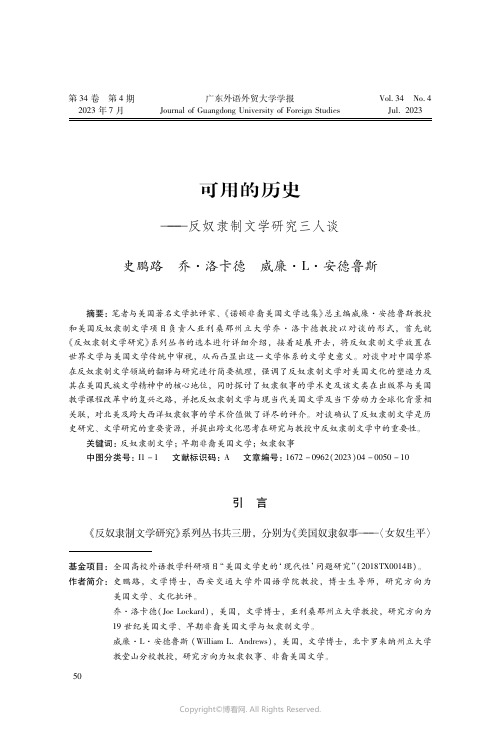
第34卷 第4期2023年7月广东外语外贸大学学报JournalofGuangdongUniversityofForeignStudiesVol 34 No.4Jul.2023基金项目:全国高校外语教学科研项目“美国文学史的‘现代性’问题研究”(2018TX0014B)。
作者简介:史鹏路,文学博士,西安交通大学外国语学院教授,博士生导师,研究方向为美国文学、文化批评。
乔·洛卡德(JoeLockard),美国,文学博士,亚利桑那州立大学教授,研究方向为19世纪美国文学、早期非裔美国文学与奴隶制文学。
威廉·L·安德鲁斯(WilliamL.Andrews),美国,文学博士,北卡罗来纳州立大学教堂山分校教授,研究方向为奴隶叙事、非裔美国文学。
可用的历史———反奴隶制文学研究三人谈史鹏路 乔·洛卡德 威廉·L·安德鲁斯 摘要:笔者与美国著名文学批评家、《诺顿非裔美国文学选集》总主编威廉·安德鲁斯教授和美国反奴隶制文学项目负责人亚利桑那州立大学乔·洛卡德教授以对谈的形式,首先就《反奴隶制文学研究》系列丛书的选本进行详细介绍,接着延展开去,将反奴隶制文学放置在世界文学与美国文学传统中审视,从而凸显出这一文学体系的文学史意义。
对谈中对中国学界在反奴隶制文学领域的翻译与研究进行简要梳理,强调了反奴隶制文学对美国文化的塑造力及其在美国民族文学精神中的核心地位,同时探讨了奴隶叙事的学术史及该文类在出版界与美国教学课程改革中的复兴之路,并把反奴隶制文学与现当代美国文学及当下劳动力全球化背景相关联,对北美及跨大西洋奴隶叙事的学术价值做了详尽的评介。
对谈确认了反奴隶制文学是历史研究、文学研究的重要资源,并提出跨文化思考在研究与教授中反奴隶制文学中的重要性。
关键词:反奴隶制文学;早期非裔美国文学;奴隶叙事 中图分类号:I1-1 文献标识码:A 文章编号:1672-0962(2023)04-0050-10引 言《反奴隶制文学研究》系列丛书共三册,分别为《美国奴隶叙事———〈女奴生平〉05及导读》(2015)、《见证:经典奴隶叙事》(2019)和《声音:小说、自传与演讲》(2019)。
美国黑人文学――历史与文化潮流PPT课件
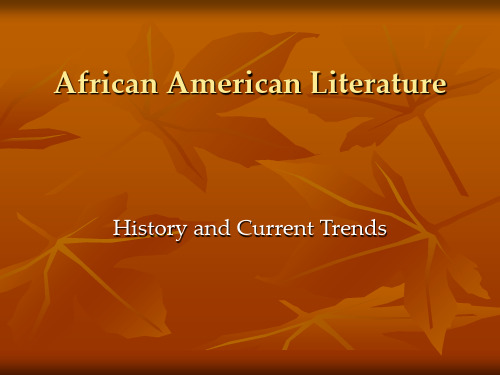
African American Literature
African American Literature
Lucy Terry (1730-1821) Thought to be the author of the oldest piece of African-American literature, “Bars, about an Indian raid on settlers in Massachusetts. It was not published until 1855.
African American Literature Post-slavery Era
African American Literature
Phillis Wheatley (1753-1784) The first African-American and the second woman to publish a book in the colonies, she is one of the best known early black poets; her work was praised by leaders of the American Revolution, including George Washington. She is one of the first writers to use an epistolary style (in the form of letters).
美国十大标志性建筑中英文介绍

4. T hundred years, the White House has stood as a symbol of the Presidency, the United States government, and the American people. Its history, and the history of the nation's capital, began when President George Washington signed an Act of Congress in December of 1790 declaring that the federal government would reside in a district "not exceeding ten miles square...on the river Potomac." President Washington, together with city planner Pierre L'Enfant, chose the site for the new residence, which is now 1600 Pennsylvania Avenue. As preparations began for the new federal city, a competition was held to find a builder of the "President's House." Nine proposals were submitted, and Irish-born architect James Hoban won a gold medal for his practical and handsome design.
美国十大标志性建筑中英文介绍

亨利詹姆斯英文简介 黛西米勒英文简介

亨利詹姆斯英文简介黛西米勒英文简介亨利詹姆斯人物履历Born in New York on April 15, 1843;1862 was admitted to Harvard Law School;From 1864 onwards began to literary creation;In 1869 traveled the United Kingdom, France and Italy and other countries, decided to leave the United States, moved to Europe; 1875 ~ 1876 living in Paris, met the blessing worship, Turgenev, Zola, Tudor and other writers;After 1878 moved to London;In 1879 the novel Daisy Miller made him famous;Published in 1881, a womans portrait, is his early creation of the most representative works;At the beginning of the 20th century, he returned to the United States and created three novels, namely, pigeon wings, envoys and gold bowls. These three novels were recognized as Jamess masterpieces. All three were selected in the 20th century. Novels and rank the forefront;1915 due to dissatisfaction with the United States in the early days of the First World War neutral attitude to join the British nationality.亨利詹姆斯成长经受JamesBorn in New York, a rich family of intellectuals. The father is a philosopher, the theologian, but the man is rude. The long brother of William was as athletic as the athlete, and later became an awesome philosopher and professor of psychology at Harvard University. Jamess childhood was very unpleasant, he grew up in fear of his brother. James had nothing to do with the family, but later patched the relationship. How he grew up under the shadow of his brother, how he influenced his inner world, and thus influenced his creation, because James was too sensitive. Laughter rarely comes from James, thanks to his early death with his friendly man, including his sister Alice, his cousin Minnie Temple, who has been very heavy to live. James has used the succession of these people as a material, in the novel Daisy Miller, a womans portrait, pigeon, envoys and gold bowl to create a series of distinctive The heroine image.James has always wanted to be a playwright, and finally with his initiative away from the theater and ended. James had been worried about the success of his new play, Gay Tomwell, but because he was so nervous that he did not catch the right opportunity. He is not good at dealing with the theater. The book tells the story that one night when he approached the theater, Oscar Wilde idealhusband is staged, he decided to give up to watch the gaudy gay wandime script performance. Because he thinks these people in the theater seem to enjoy the pleasure of their own, he felt in his life he never had this look.He did not know in these so happy, so triumphant, so happy among the people How to spend that three hours. So James went back again.Most of the tension in Jamess life comes from his alienation of what he cherishes. In fact, he has entered the upper class in Europe, rich writer to be able to contact him and be proud of, but he still feel that he is an outsider: is a bachelor, there is a tendency to homosexuality, although he suppressed this desire. At the same time he was an American, because then the United States has just developed, advocating European culture and worship of Europeans was a kind of atmosphere of the American upper class. He felt humiliated, began to look away from the publics attention, reduced contact with family and friends, traveled to Rome and Florence, where he intended to spend the rest of his life quietly. And later in England to buy a house with a garden, so settled down and dedicated to writing. Between 1902 and 1905, James published three of the 20th centurys most promising novels: Pigeon Wing, Envoys, Golden Bowl. In 1915 James joined the British. Jamess writing is very focused and very devoted, he put the novel as a subtlecomprehensive art to seriously. Too seriously, so he is always in life and creation is intertwined with psychological anxiety and tension, so that the psychological balance is often broken.亨利詹姆斯英文简介。
英语文学专业需要看的书籍推荐

美国黑人文学说明(红色已读,紫色已下载)2010-9-8Subject: 导师书单Frederick Douglass: Narrative of the Life of Frederick Douglass, an American Slav e/:Jean Toomer, CaneNella Larsen, PassingZora Neale Hurston, Their Eyes Were Watching GodRichard Wright, Native SonRalph Ellison, Invisible ManToni Morrison: MercyAlice Walker, The color Purple一教材源材料:主要选材于以下几本书:11.Henry Louis Gates, Jr., and Nellie Y. McKay, et al, (eds.), The Norton Anthology of African American Literature(New York: W.W. Norton & Co, 1997).2.Patricia Liggins Hill, et al, (eds.), Call and Response: The Riverside Anthology of the African American Literary Tradition(New York: Houghton Mifflin, 1997).3.Michael S. Harper and Anthony Walton (eds.), The Vintage Book of African American Poetry (New York: Vintage, 2000).Jerry W. Ward, Jr. (ed.), Trouble the Water: 250 Years of African-American Poetry (New York: Signet, 1997)4.James Baldwin, Notes of a Native Son, Nobody knows My Name, The Fire Next Time5.C. W. E. Bigsby, The Second Black Renaissance: Essays in Black Literature 6.Ralph Ellison, Shadow and Act, Going to the Territory, Collected Essays 7.Addison Gayle Jr. (ed.), Black Expression: Essays By and About Black Americans in the Creative Arts二教学理念:二十世纪美国黑人作家对美国文学的发展做出了不可磨灭的贡献,黑人文学已经成为美国文学及美国文化不可或缺的组成部分。
美国黑人文学中女性身份认知与抗争

美国黑人文学中女性身份认知与抗争摘要:作为身受种族歧视与性别歧视双重压迫的特殊群体,美国黑人女性的身份认知过程充满艰辛和曲折。
黑人女性作家显示出惊人的勇气和坚韧的毅力,塑造了一系列光辉动人的形象,反抗种族及男权社会强加给她们的不公共形象,在完成黑人女性文化身份认证的同时,也以自己的创作为黑人文学抹上了浓墨重彩的一笔。
关键词:美国黑人女性身份Abstract: As the community which has long-been-oppressed by racialism and sexism, Afro-American female has been through a long road full of hardship on their way of ego-identification. Female Afro-American writers created countless glorious Afro-American women with tremendous courage and strong wills, fighting against the unfairness given by the racial and sexist society. They fulfilled their destiny of ego-identification, meanwhile giving magnificent, beautiful colors to the Afro-American literature.Key words: Afro-American, Females, Identity身份问题是一个国家或民族在其文化发展过程中必然会遇到的问题。
这种身份并非由血统决定,而是社会与文化作用的结果。
被迫从非洲迁徙到美国、被割裂了与自身文化环境的联系后又被嫁接到西方文化的土壤中来,在社会生活中又一再被拒绝、被排斥――这一独特的历史和现实处境决定了身份问题对于非洲裔美国黑人来说具有极大的重要性。
美国国会图书馆推荐书单
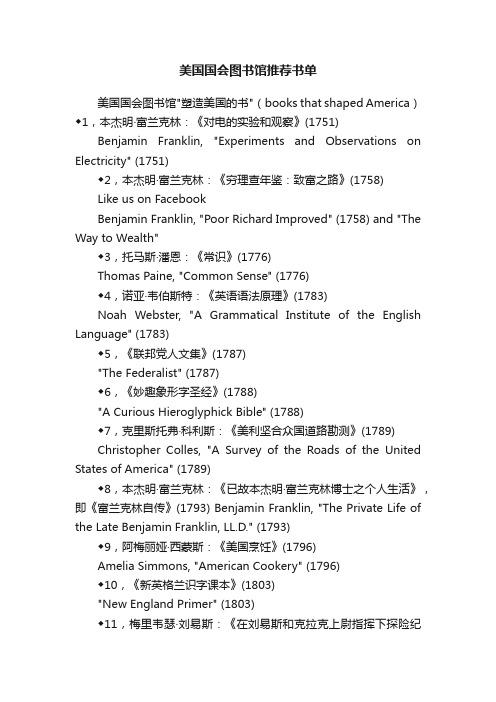
美国国会图书馆推荐书单美国国会图书馆"塑造美国的书"(books that shaped America)◆1,本杰明·富兰克林:《对电的实验和观察》(1751)Benjamin Franklin, "Experiments and Observations on Electricity" (1751)◆2,本杰明·富兰克林:《穷理查年鉴:致富之路》(1758)Like us on FacebookBenjamin Franklin, "Poor Richard Improved" (1758) and "The Way to Wealth"◆3,托马斯·潘恩:《常识》(1776)Thomas Paine, "Common Sense" (1776)◆4,诺亚·韦伯斯特:《英语语法原理》(1783)Noah Webster, "A Grammatical Institute of the English Language" (1783)◆5,《联邦党人文集》(1787)"The Federalist" (1787)◆6,《妙趣象形字圣经》(1788)"A Curious Hieroglyphick Bible" (1788)◆7,克里斯托弗·科利斯:《美利坚合众国道路勘测》(1789)Christopher Colles, "A Survey of the Roads of the United States of America" (1789)◆8,本杰明·富兰克林:《已故本杰明·富兰克林博士之个人生活》,即《富兰克林自传》(1793) Benjamin Franklin, "The Private Life of the Late Benjamin Franklin, LL.D." (1793)◆9,阿梅丽娅·西蒙斯:《美国烹饪》(1796)Amelia Simmons, "American Cookery" (1796)◆10,《新英格兰识字课本》(1803)"New England Primer" (1803)◆11,梅里韦瑟·刘易斯:《在刘易斯和克拉克上尉指挥下探险纪行》(1814)Meriwether Lewis, "History of the Expedition Under the Command of the Captains Lewis and Clark" (1814)◆12,华盛顿·欧文:《睡谷传奇》(1820)Washington Irving, "The Legend of Sleepy Hollow" (1820)◆13,威廉·霍尔姆斯·麦格菲:《新订麦格菲美德读本》(1836)William Holmes McGuffey, "McGuffey's Newly Revised Eclectic Primer" (1836)◆14,萨缪尔·戈德里奇:《彼得·帕利万国通史》(1837)Samuel Goodrich, "Peter Parley's Universal History" (1837)◆15,弗雷德里克·道格拉斯:《弗雷德里克·道格拉斯自述》(1845)Frederick Douglass, "The Narrative of the Life of Frederick Douglass" (1845)◆16,纳撒尼尔·霍桑:《红字》(1850)Nathaniel Hawthorne, "The Scarlet Letter" (1850)◆17,赫尔曼·梅尔维尔:《莫比·迪克》,或称《白鲸》(1851)Herman Melville, "Moby-Dick"; or, "The Whale" (1851)◆18,哈丽叶特·比彻·斯托:《汤姆叔叔的小屋》(1852)Harriet Beecher Stowe, "Uncle Tom's Cabin" (1852)◆19,亨利·大卫·梭罗:《瓦尔登湖》,或称《林中生活》(1854)Henry David Thoreau, "Walden;" or, "Life in the Woods" (1854)◆20,沃尔特·惠特曼:《草叶集》(1855)Walt Whitman, "Leaves of Grass" (1855)◆21,路易莎·梅·奥尔科特:《小妇人》,或称《梅格、蜀雯、佩丝和艾美》(1868) Louisa May Alcott, "Little Women," or, "Meg, Jo, Beth and Amy" (1868)◆22,霍拉修·阿尔杰:《卖火柴的小男孩马克》(1869)Horatio Alger Jr., "Mark, the Match Boy" (1869)◆23,凯瑟琳·比彻、哈丽叶特·比彻·斯托:《美国妇女家务手册》(1869) Catharine E. Beecher and Harriet Beecher Stowe, "The American Woman's Home" (1869) ◆24,马克·吐温:《哈克贝利·芬历险记》(1884)Mark Twain, "Adventures of Huckleberry Finn" (1884)◆25,埃米莉·狄金森:《诗集》(1890)Emily Dickinson, "Poems" (1890)◆26,雅各布·里斯:《另一半怎样生活》(1890)Jacob Riis, "How the Other Half Lives" (1890)◆27,斯蒂芬·克莱恩:《红色英勇勋章》(1895)Stephen Crane, "The Red Badge of Courage" (1895)◆28,弗兰克·鲍姆:《绿野仙踪》(1900)L. Frank Baum, "The Wonderful Wizard of Oz" (1900)◆29,萨拉·布拉德福:《哈丽叶特,人民的摩西》(1901)Sarah H. Bradford, "Harriet, the Moses of Her People" (1901)◆30,杰克·伦敦:《荒野的呼唤》(1903)Jack London, "The Call of the Wild" (1903)◆31,WEB·杜波伊斯:《黑人的灵魂》(1903)W.E.B. Du Bois, "The Souls of Black Folk" (1903)◆32,艾达·塔贝尔:《标准石油公司史》(1904)Ida Tarbell, "The History of Standard Oil" (1904)◆33,厄普顿·辛克莱:《屠场》(1906)Upton Sinclair, "The Jungle" (1906)◆34,亨利·亚当斯:《亨利·亚当斯的教育》(1907)Henry Adams, "The Education of Henry Adams" (1907)◆35,威廉·詹姆士:《实用主义》(1907)William James, "Pragmatism" (1907)◆36,赞恩·格雷:《紫艾草骑士》(1912)Zane Grey, "Riders of the Purple Sage" (1912)◆37,埃德加·赖斯·伯勒斯:《人猿泰山》(1914)Edgar Rice Burroughs, "Tarzan of the Apes" (1914)◆38,玛格丽特·桑杰:《有限生育》(1914)Margaret Sanger, "Family Limitation" (1914)◆39,威廉·卡洛斯·威廉斯:《春天及一切》(1923)William Carlos Williams, "Spring and All" (1923)◆40,罗伯特·弗罗斯特:《新罕布什尔》(1923)Robert Frost, "New Hampshire" (1923)◆41,斯科特·菲茨杰拉德:《了不起的盖茨比》(1925)F. Scott Fitzgerald, "The Great Gatsby" (1925)◆42,朗斯顿·休斯:《疲倦的布鲁斯》(1925)Langston Hughes, "The Weary Blues" (1925)◆43,威廉·福克纳:《喧哗与骚动》(1929)William Faulkner, "The Sound and the Fury" (1929)◆44,达谢尔·哈米特:《红色收获》(1929)Dashiell Hammett, "Red Harvest" (1929)◆45,厄玛·罗鲍尔:《烹饪之乐》(1931)Irma Rombauer, "Joy of Cooking" (1931)◆46,玛格丽特·米切尔:《乱世佳人》(1936)Margaret Mitchell, "Gone With the Wind" (1936)◆47,戴尔·卡内基:《如何赢得朋友和影响他人》Dale Carnegie, "How to Win Friends and Influence People" (1936)◆48,佐拉·尼尔·赫斯顿:《他们眼望上帝》(1937)Zora Neale Hurston, "Their Eyes Were Watching God" (1937)◆49,联邦作家计划:《爱达荷:图文导览》(1937)Federal Writers' Project, "Idaho: A Guide in Word and Pictures" (1937)◆50,桑顿·怀尔德:《我们的镇子》(1938)Thornton Wilder, "Our Town: A Play" (1938)◆51,《匿名戒酒》(1939)"Alcoholics Anonymous" (1939)◆52,约翰·斯坦贝克:《愤怒的葡萄》(1939)John Steinbeck, "The Grapes of Wrath" (1939)◆53,欧内斯特·海明威:《钟为谁鸣》(1940)Ernest Hemingway, "For Whom the Bell Tolls" (1940)◆54,理查德·赖特:《土生子》(1940)Richard Wright, "Native Son" (1940)◆55,贝蒂·史密斯:《布鲁克林有棵树》(1943)Betty Smith, "A Tree Grows in Brooklyn" (1943)◆56,本杰明·博特金:《美国民歌金库》(1944)Benjamin A. Botkin, "A Treasury of American Folklore" (1944)◆57,格温多琳·布鲁克斯:《铜镇街头》(1945)Gwendolyn Brooks, "A Street in Bronzeville" (1945)◆58,本杰明·斯波克:《育儿常识》(1946)Benjamin Spock, "The Common Sense Book of Baby and Child Care" (1946) ◆59,尤金·奥尼尔:《送冰的人来了》(1946) Eugene O'Neill, "The Iceman Cometh" (1946)◆60,玛格丽特·怀斯·布朗:《晚安月球》(1947)Margaret Wise Brown, "Goodnight Moon" (1947)◆61,田纳西·威廉斯:《欲望号街车》(1947)Tennessee Williams, "A Streetcar Named Desire" (1947)◆62,阿尔弗雷德·金赛:《男性性行为》(1948)Alfred C. Kinsey, "Sexual Behavior in the Human Male" (1948)◆63,JD·塞林格:《麦田里的守望者》(1951)J.D. Salinger, "The Catcher in the Rye" (1951)◆64,拉尔夫·埃利森:《看不见的人》(1952)Ralph Ellison, "Invisible Man" (1952)◆65,EB·怀特:《夏洛的网》(1952)E.B. White, "Charlotte's Web" (1952)◆66,雷·布拉德伯里:《华氏451》(1953)Ray Bradbury, "Fahrenheit 451" (1953)◆67,艾伦·金斯堡:《嚎叫》(1956)Allen Ginsberg, "Howl" (1956)◆68,安·兰德:《阿特拉斯耸耸肩》(1957)Ayn Rand, "Atlas Shrugged" (1957)◆69,苏斯博士:《帽中猫》(1957)Dr. Seuss, "The Cat in the Hat" (1957)◆70,杰克·凯鲁亚克:《在路上》(1957)Jack Kerouac, "On the Road" (1957)◆71,哈珀·李:《杀死一只反舌鸟》(1960)Harper Lee, "To Kill a Mockingbird" (1960)◆72,约瑟夫·海勒:《第二十二条军规》(1961)Joseph Heller, "Catch-22" (1961)◆73,罗伯特·海因莱:《异乡异客》(1961)Robert E. Heinlein, "Stranger in a Strange Land" (1961)◆74,埃兹拉·杰克·基茨:《下雪天》(1962)Ezra Jack Keats, "The Snowy Day" (1962)◆75,莫里斯·森达克:《野兽家园》(1963)Maurice Sendak, "Where the Wild Things Are" (1963)◆76,詹姆斯·鲍德温:《烈火将燃》(1963)James Baldwin, "The Fire Next Time" (1963)◆77,贝蒂·弗里丹:《女性迷思》(1963)Betty Friedan, "The Feminine Mystique" (1963)◆78,马尔科姆·X、亚历克斯·黑利:《马尔科姆·X自传》(1965) Malcolm X and Alex Haley, "The Autobiography of Malcolm X" (1965) ◆79,拉尔夫·纳德:《任何速度都不安全》(1965) Ralph Nader, "Unsafe at Any Speed" (1965)◆80,蕾切尔·卡森:《寂静的春天》(1962)Rachel Carson, "Silent Spring" (1962)◆81,杜鲁门·卡波特:《冷血》(1966)Truman Capote, "In Cold Blood" (1966)◆82,詹姆斯·沃森:《双螺旋》(1968)James D. Watson, "The Double Helix" (1968)◆83,迪·布朗:《魂归伤膝谷》(1970)Dee Brown, "Bury My Heart at Wounded Knee" (1970)◆84,波士顿妇女健康图书协会:《我们的身体,我们自己》(1971) Boston Women's Health Book Collective, "Our Bodies, Ourselves" (1971) ◆85,卡尔·萨根:《宇宙》(1980)Carl Sagan, "Cosmos" (1980)◆86,托妮·莫里森:《宠儿》(1987)Toni Morrison, "Beloved" (1987)◆87,兰迪·希尔茨:《乐队继续演奏》(1987)Randy Shilts, "And the Band Played On" (1987)◆88,塞萨尔·查韦斯:《塞萨尔·查韦斯语录》(2002) Ce?sar Cha?vez, "The Words of Ce s ar Cha v ez" (2002)美国国会图书馆评出的塑造读者的25本书《哈克贝利·费恩历险记》《地球颤栗》《富兰克林自转》《马尔科姆.X自传》《圣经》《麦田里的守望者》《夏洛的网》《安妮日记》《唐吉柯德》《乱世佳人》《广岛》《如何赢取朋友和影响人》《我知道为什么笼中的鸟儿会唱歌》《隐形人》《小王子》《小妇人》《指环王》《根》《神秘园》《寂静的春天》《杀死一只知更鸟》《金银岛》《瓦尔登湖》《战争与和平》《你的降落伞是什么颜色》。
纳撒尼尔·霍桑作品《拉帕齐尼的女儿》与圣经的联系
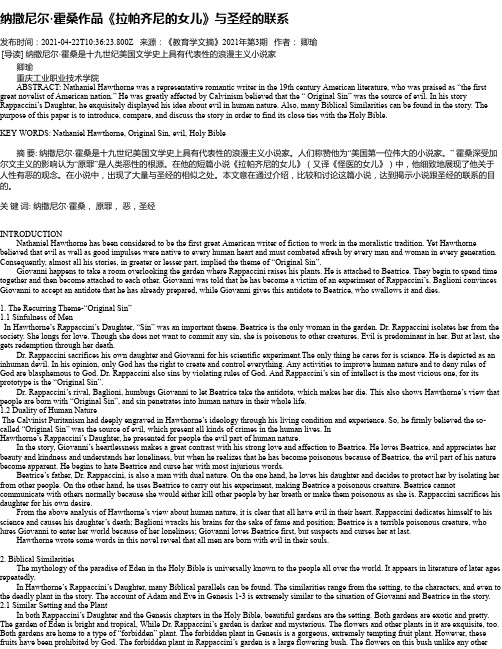
纳撒尼尔·霍桑作品《拉帕齐尼的女儿》与圣经的联系发布时间:2021-04-22T10:36:23.800Z 来源:《教育学文摘》2021年第3期作者:卿瑜[导读] 纳撒尼尔·霍桑是十九世纪美国文学史上具有代表性的浪漫主义小说家卿瑜重庆工业职业技术学院ABSTRACT: Nathaniel Hawthorne was a representative romantic writer in the 19th century American literature, who was praised as “the first great novelist of American nation.” He was greatly affected by Calvinism believed that the “ Original Sin” was the source of evil. In his story Rappaccini’s Daughter, he exquisitely displayed his idea about evil in human nature. Also, many Biblical Similarities can be found in the story. The purpose of this paper is to introduce, compare, and discuss the story in order to find its close ties with the Holy Bible.KEY WORDS: Nathaniel Hawthorne, Original Sin, evil, Holy Bible摘要: 纳撒尼尔·霍桑是十九世纪美国文学史上具有代表性的浪漫主义小说家。
人们称赞他为“美国第一位伟大的小说家。
” 霍桑深受加尔文主义的影响认为“原罪”是人类恶性的根源。
全新版大学英语综合5 教程 Unit6 Grant and Lee

3. What did Grant and his army succeed in doing? Grant and his army attacked Vicksburg from the south; after a series of short clashes outside of Vicksburg, Confederate defenders hole up inside the city’s fortified defenses. 4. What kind of life did people living in Vicksburg live during the siege? Residents of the town were forced to live in caves. Food supplies dwindled to nothing. They were shooting horses and eventually even eating rats because of the desperation.
Lee’s Chronology A Video Clip about Robert Lee Table Completion
An English Poem Directions: Listen to the poem, then fill in the blanks with the words you hear from the recording. The Blue and the Gray By the flow of the inland river, _____ of iron have fled, Whence the fleets Where the blades of the grave-grass quiver, Asleep are the ranks of the dead: Under the sod and the dew, Waiting the judgment ________ -day; Under the one, the Blue, Under the other, the Gray.
带你认识SAT阅读里的名人
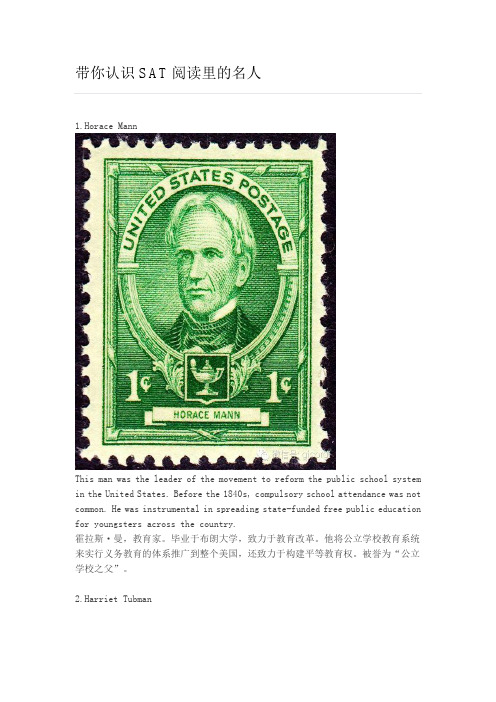
带你认识SAT阅读里的名人1.Horace MannThis man was the leader of the movement to reform the public school system in the United States. Before the 1840s, compulsory school attendance was not common. He was instrumental in spreading state-funded free public education for youngsters across the country.霍拉斯·曼,教育家。
毕业于布朗大学,致力于教育改革。
他将公立学校教育系统来实行义务教育的体系推广到整个美国,还致力于构建平等教育权。
被誉为“公立学校之父”。
2.Harriet TubmanThis woman, along with Sojourner Truth, helped fugitive slaves flee slave states or the United States through an elaborate network called the Underground Railroad.哈莉特·塔布曼是美国废奴主义者,杰出的黑人废奴主义运动家。
她本人就是一个逃跑的奴隶,帮助许多黑人奴隶逃亡,被称为“黑摩西”或“摩西祖母”。
美国废奴主义运动的领袖约翰·布朗称她为“塔布曼将军”。
3.Sojourner TruthThis woman, along with Harriet Tubman, helped fugitive slaves flee slave states or the United States through an elaborate network called the Underground Railroad.是和上面那位女士一起合作的另一位女士~“地下铁路”的重要组织者。
Harriet Beecher Stowe介绍 PPT

Uncle Tom's Cabin
1.general introduction 2.background of the novel 3.plot overview 4.analysis of major characters 5.influence of the novel
general introduction
大家应该也有点累了,稍作休息
大家有疑问的,可以询问和交流
analysis of major characters
04
1.Uncle Tom
black Christian slave
stands up for his beliefs
kind hearted
honest
2.Simon Legree
cruel slave owner
and freedom for all people.
plot overview
03
Eliza escapes with her son, Tom was sold ”down the river”
Eliza's family hurted.Tom's life with st.clare Tom was sold to Simon Legree Final selection
01
an anti-slavery(反奴隶制)novel was published in 1852 in American It mainly depicts the tragic life of a longsuffering black slave Uncle Tom,in the south of America before the civil war(南北战争)
美国黑人文学——历史与文化潮流
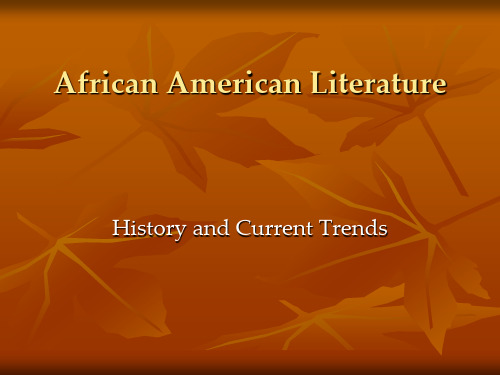
African American Literature The Harlem Renaissance
Alain Locke (1886-1954) essayist, editor Claude McKay (1889-1948) poet Jean Toomer (1894-1967) poet Anne Spencer (1882-1975) poet
African American Literature The Harlem Renaissance
The artistic and socio-cultural awakening of African Americans in the 1920s and 1930s It was centered around the vibrant African American community in Harlem, New York, but had farreaching influence in art, music, literature and social thought. The interplay of art and race, and the aesthetic criteria for evaluating black writing are some of the intellectual legacies of the Harlem Renaissance.
African can Literature
History and Current Trends
African American Literature
The first writings by blacks in America was autobiographical and became known as the Slave Narrative Three themes developed in early African American writings around the issue of slavery: accommodation, protest, and escape
奴隶制藩篱中黑人母亲主体性的缺失_评_宠儿_中的黑人母亲_塞丝_
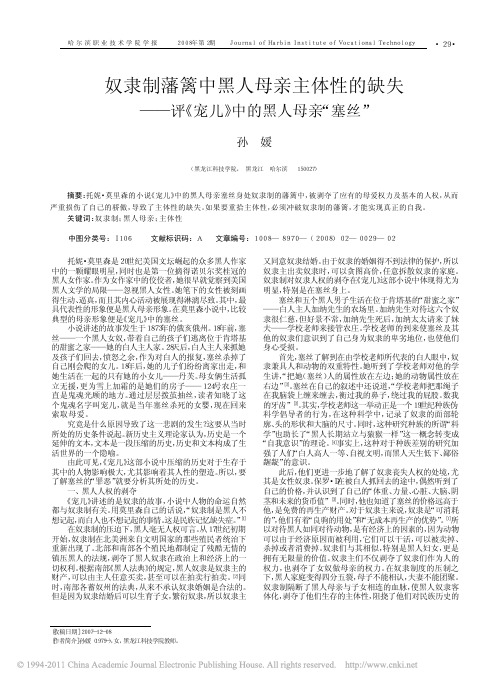
哈尔滨职业技术学院学报 2008年第2期 Journal of Harbin Institute of Vocational Technology・29・中图分类号:I106 文献标识码:A 文章编号:1008—8970—(2008)02—0029—02[收稿日期]2007-12-08[作者简介]孙媛(1979-),女, 黑龙江科技学院教师。
托妮・莫里森是20世纪美国文坛崛起的众多黑人作家中的一颗耀眼明星,同时也是第一位摘得诺贝尔奖桂冠的黑人女作家。
作为女作家中的佼佼者,她很早就觉察到美国黑人文学的局限——忽视黑人女性。
她笔下的女性被刻画得生动、逼真,而且其内心活动被展现得淋漓尽致。
其中,最具代表性的形象便是黑人母亲形象。
在莫里森小说中,比较典型的母亲形象便是《宠儿》中的塞丝。
小说讲述的故事发生于1873年的俄亥俄州。
18年前,塞丝——一个黑人女奴,带着自己的孩子们逃离位于肯塔基的甜蜜之家——她的白人主人家。
28天后,白人主人来抓她及孩子们回去,愤怒之余,作为对白人的报复,塞丝杀掉了自己刚会爬的女儿。
18年后,她的儿子们纷纷离家出走,和她生活在一起的只有她的小女儿——丹芙。
母女俩生活孤立无援,更为雪上加霜的是她们的房子——124号农庄一直是鬼魂光顾的地方。
通过层层拨茧抽丝,读者知晓了这个鬼魂名字叫宠儿,就是当年塞丝杀死的女婴,现在回来索取母爱。
究竟是什么原因导致了这一悲剧的发生?这要从当时所处的历史条件说起。
新历史主义理论家认为,历史是一个延伸的文本,文本是一段压缩的历史,历史和文本构成了生活世界的一个隐喻。
由此可见,《宠儿》这部小说中压缩的历史对于生存于其中的人物影响极大,尤其影响着其人性的塑造。
所以,要了解塞丝的“罪恶”就要分析其所处的历史。
一、 黑人人权的剥夺《宠儿》讲述的是奴隶的故事,小说中人物的命运自然都与奴隶制有关。
用莫里森自己的话说,“奴隶制是黑人不想记起,而白人也不想记起的事情。
欧美文学重点翻译3
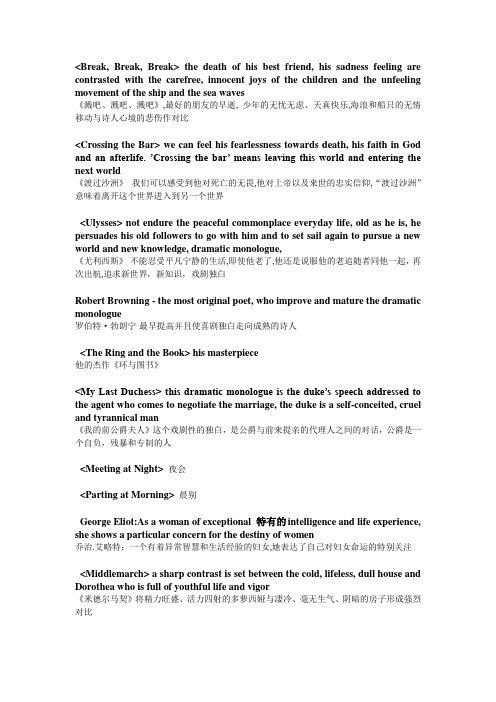
<Break, Break, Break> the death of his best friend, his sadness feeling are contrasted with the carefree, innocent joys of the children and the unfeeling movement of the ship and the sea waves《溅吧、溅吧、溅吧》,最好的朋友的早逝, 少年的无忧无虑、天真快乐,海浪和船只的无情移动与诗人心境的悲伤作对比<Crossing the Bar> we can feel his fearlessness towards death, his faith in God and an afterlife. ’Crossing the bar’ means leaving this world and entering the next world《渡过沙洲》我们可以感受到他对死亡的无畏,他对上帝以及来世的忠实信仰,“渡过沙洲”意味着离开这个世界进入到另一个世界<Ulysses> not endure the peaceful commonplace everyday life, old as he is, he persuades his old followers to go with him and to set sail again to pursue a new world and new knowledge, dramatic monologue,《尤利西斯》不能忍受平凡宁静的生活,即使他老了,他还是说服他的老追随者同他一起,再次出航,追求新世界,新知识,戏剧独白Robert Browning - the most original poet, who improve and mature the dramatic monologue罗伯特·勃朗宁-最早提高并且使喜剧独白走向成熟的诗人<The Ring and the Book> his masterpiece他的杰作《环与图书》<My Last Duchess> this dramatic monologue is the duke’s speech addressed to the agent who comes to negotiate the marriage, the duke is a self-conceited, cruel and tyrannical man《我的前公爵夫人》这个戏剧性的独白,是公爵与前来提亲的代理人之间的对话,公爵是一个自负,残暴和专制的人<Meeting at Night> 夜会<Parting at Morning>晨别George Eliot:As a woman of exceptional 特有的intelligence and life experience, she shows a particular concern for the destiny of women乔治.艾略特:一个有着异常智慧和生活经验的妇女,她表达了自己对妇女命运的特别关注<Middlemarch> a sharp contrast is set between the cold, lifeless, dull house and Dorothea who is full of youthful life and vigor《米德尔马契》将精力旺盛、活力四射的多萝西娅与凄冷、毫无生气、阴暗的房子形成强烈对比Thomas Hardy - both a naturalistic and a critical realist writerLocal-colored, Wessex, ’novels of character and environment’托马斯·哈代-既是一个自然主义作家,也是一个批判现实主义作家,他的作品带有地方乡土色彩,艾塞克斯-小说的背景及特征<Tess of the D’Urbervilles> experience is as to i ntensity, and not as to duration 《德伯家的苔丝》的经验是与其容忍,不如反抗American Romantic Period 美国浪漫主义时期Started with Washington Irving’s <The Sketch Book> and ended with Whitman’s <Leaves of Grass>, also called ’the American Renaissance’Free expression of emotion, escapes from society, and return to nature New England Transcendentalism以华盛顿欧文的《见闻杂记》开始,以惠特曼的《草叶集》结束。
- 1、下载文档前请自行甄别文档内容的完整性,平台不提供额外的编辑、内容补充、找答案等附加服务。
- 2、"仅部分预览"的文档,不可在线预览部分如存在完整性等问题,可反馈申请退款(可完整预览的文档不适用该条件!)。
- 3、如文档侵犯您的权益,请联系客服反馈,我们会尽快为您处理(人工客服工作时间:9:00-18:30)。
• Fought over the issue of slavery, particularly the expansion of slavery into the western territories • Seven slave states seceded (separated) from the United States • Created the Confederate States of America, also known as the Confederacy or simply the South • Remaining states became the Union or the North • Foreign countries refused to get involved throughout the war, despite requests for help from the South
Harriet Jacobs (1813-1897)
• African-American writer and escaped slave • Became an abolitionist speaker and reformer • Wrote one of the first female autobiographical slave narratives • Provided a detailed account of the sexual harassment and abuse female slaves experienced • Victim of the Fugitive Slave Laws
– These states included Texas, Alabama, Mississippi, Georgia, South Carolina and Florida
• Lincoln rejected secession as illegal, but stated that he would not be the one to start a war • The South took control of several federal forts within the territory they claimed • A peace conference failed to reach a compromise, and both sides prepared for war • The South assumed that European countries would help
– Required police to return runaway slaves to their owners – Even slaves who reached the North were still in danger of being caught and returned to the South – Freed slaves were also victims of these laws
• In 1860, Abraham Lincoln was elected president • Lincoln was opposed to the expansion of slavery into new western territories • The economy in the South relied on slave labor in order to produce and harvest cotton • Southern states wanted slavery to expand, while Lincoln refused • On March 4, 1861, seven slave states seceded from the United States of America
• Born a slave in Edenton, North Carolina • Father was an enslaved black carpenter owned by Andrew Knox • Mother was an enslaved black woman owned by John Horniblow • Jacobs inherited her status of slave from her mother • At age 6, mother died and Jacobs lived with her mother’s mistress, who taught her to read, write and sew • In 1825, mistress died and Jacobs was given to her mistress’ niece, who was only 5 years old • Child’s father, Dr. Norcom, became unofficial master
• One of the earliest true industrial wars • Railroads, the telegraph, steamships, and massproduced weapons were used throughout • Civilian factories, mines, shipyard, banks, transportation, and food supplies were used • The civilian involvement foreshadowed World War I • Remains the deadliest war in American history • About 750,000 soldiers died, and an unknown number of civilians as well • Some estimates state that 10% of all Northern men 20-45 years old, and 30% of all Southern white males 18-40 died
– Europe at this time relied on cotton produced in the South – England in particular had a close economic relationship with the cotton-producing South
• On January 1, 1863, Lincoln issued the Emancipation Proclamation • The Proclamation declared that all slaves in the rebellious Southern states were free • Applied to 3.1 million of the 4 million slaves in the United States at the time • Also ordered that some freed slaves could join the Union Army • Did not compensate the owners • Did not outlaw slavery itself • Did not make ex-slaves (called freedmen) citizens • Made the end of slavery a war goal, along with the reunification of the United States
• Jacobs was sexually harassed by Norcom • He refused to allow her to marry anyone • Jacobs took a white lover in order to escape Norcom’s attentions • Had two children, who were born slaves despite having a free white father • Norcom threatened to sell Jacobs children if she continued to refuse his sexual advances • In 1835, Jacobs escaped and hid in her grandmother’s attic • In 1842, escaped to the North while her lover purchased his own children and sent them North • In 1852, Jacobs finally received her freedom
– These states were Arkansas, Tennessee, North Carolina and Virginia
• The North took control of the border states and established a naval blockade that damaged the economy in the South • England considered joining the war, but decided against it after the South lost an important battle
ቤተ መጻሕፍቲ ባይዱ
• On April 12, 1861, the South attacked Fort Sumter, a fort held by Union troops • Lincoln asked each state to provide troops to retake the fort • Four more slave states, which had previously refused to secede, finally joined the South
